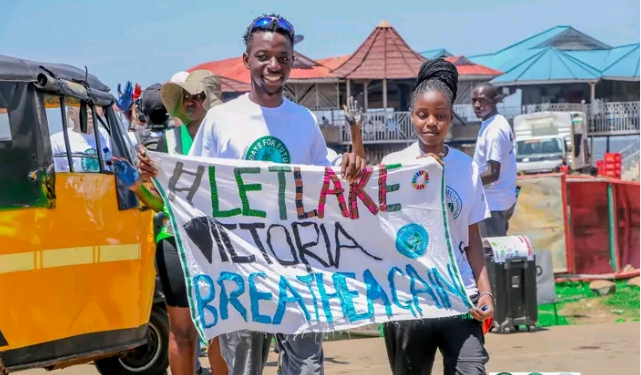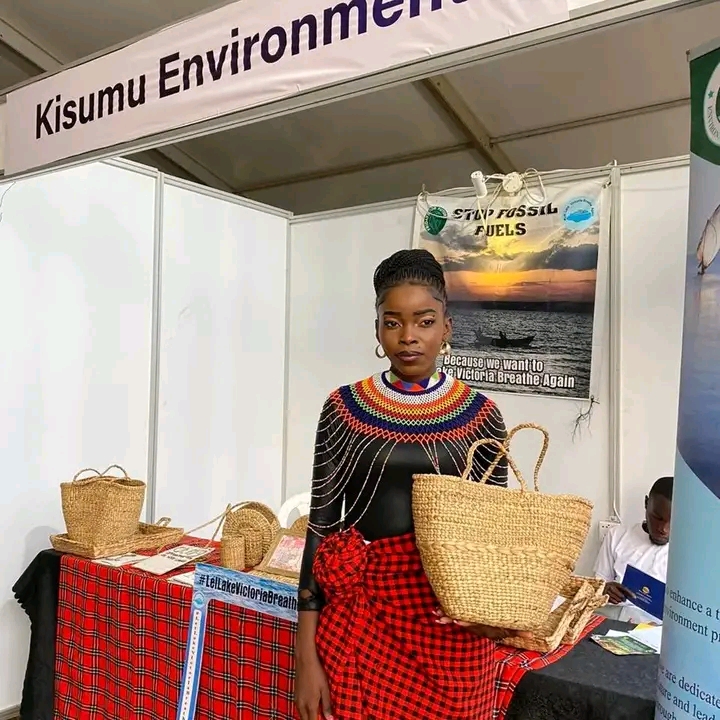Turning the Invasive Water Hyacinth in Lake Victoria into Livelihood Opportunities for the Community –
Kisumu, a charming city along the shores of Lake Victoria, is a place where life has revolved around the water for generations. The lake, often described as the region’s lifeblood, has supported communities through fishing, transport, and culture. However, Lake Victoria now faces an ecological crisis, an invasion of water hyacinth, an aquatic plant disrupting its ecosystem and livelihoods.
Despite its vibrant purple flowers, water hyacinth creates chaos. The fast-growing plant clogs waterways, entangles fishing nets, and depletes oxygen levels in the water, leading to fish deaths. It also creates stagnant pools that breed mosquitoes and snails, increasing waterborne diseases like malaria and bilharzia. For the communities dependent on the lake, the plant represents a severe threat to their survival.
Amidst this challenge, Kisumu residents display resilience, finding innovative ways to reclaim their lake. One such example is the Kisumu Environmental Champions, a grassroots group led by Rahminna Paullette. Rahminna, inspired by her mother, Miriam Wanjiku, has transformed the water hyacinth problem into opportunities for sustainable livelihoods.
Their “Let Lake Victoria Breathe Again” campaign combines environmental advocacy with practical solutions like creating eco-friendly products from hyacinth. Through a one on one Interview, Miriam shares about their experience;
A Mother’s Perspective
What has it been like to mentor Rahminna as she builds the Kisumu Environmental Champions?
Miriam Wanjiku: Watching Rahminna turn her passion into a community movement is inspiring. Her leadership skills have flourished, motivating others to join the fight for a cleaner environment. Her ability to engage youth and drive collaborations shows her dedication to positive change.
What role did you play in supporting her vision?
I provided encouragement and mentorship, helping her refine ideas and strategies. We brainstormed on projects and worked to connect her with local organizations and resources for impactful partnerships.
The Birth of an Initiative
When did Rahminna decide to tackle the water hyacinth crisis?
It started during a community cleanup where she saw the lake choked by hyacinth. She realized the issue wasn’t just environmental but also a threat to livelihoods. Encouraged by the campaign’s potential, she assembled a team to craft eco-products from hyacinth and strengthen advocacy efforts.
What challenges inspired the team’s approach?
Growing up in Kisumu, Rahminna witnessed pollution and environmental degradation. Limited funding and resources pushed the team to innovate, using hyacinth and repurposed plastics for sustainable solutions.
The Impact of Water Hyacinth
What has been the most devastating impact of water hyacinth?
It disrupts fishing—a key livelihood—by choking waterways and reducing fish populations. Families face income losses, food insecurity, and limited access to clean water. The economic ripple effects are widespread, affecting markets and tourism.
How has the community adapted?
Initially overwhelmed, many have embraced solutions like eco-product crafting and skill-building workshops, reducing reliance on fishing while fostering environmental stewardship.
Eco-Products as Solutions
How have eco-products empowered families?
Women and youth now have income opportunities through crafting and selling products like baskets and biofuels. This fosters financial independence and entrepreneurial skills, reducing unemployment.
Clean-Ups and Mobilization
How do you mobilize the community?
Through awareness campaigns, partnerships, and workshops, we engage schools, youth, and businesses. Participants see the direct impact of their efforts, building momentum for clean-ups.
What has been the most rewarding experience?
Seeing polluted areas transform and reluctant participants become advocates is incredibly fulfilling.
The Legacy and Future
What kind of legacy do you hope to leave?
I want to inspire environmental stewardship and show how local action can create global change.
What are your hopes for the initiative?
A Lake Victoria free from degradation, supporting thriving communities and ecosystems, and serving as a model for addressing similar crises worldwide.
Turning the Invasive Water Hyacinth in Lake Victoria into Livelihood Opportunities for the Community









